THE OPIUM WARS
Opium,
generally used as narcotic and analgesic, is produced from opium poppy plant
which was first domesticated in Mediterranean region during Roman Empire. The
opium poppy was introduced many years earlier in China by Arab merchants and
had been cultivating widely prior to the beginning of British trade in Asia.
What Caused First Opium War ?
British
stepped in China in 1637 and set up
trading station in Canton in 1715 which facilitated the import of tobacco and
opium into China. But, reaching till 1799,
the edicts from Yung Ching controlled the soaring use of opium as it’s
use was regarded as a high level of crime and even lead to death sentence. The
Chinese government, aware of ever-expanding British influence and the impact of
opium use in society, threatened to stop profitable tea trade and thereby,
helped to alleviate the direct import of opium. The opium trade was considered
as a major cause of economic recession, and hence ,in 1839, the government made
an effort at closing off their country to foreigners.
 |
| Canton and it's territorries source: wikipedia |
Lin Tsehsen,
an anti-opium person, was assigned to the post of imperial commissioner with
the task of wiping out opium from China, and to no surprise, he instantly sent his troops against British
to seize and destroy opium without compensation in the warehouse
in Canton. Lin made 1,600 arrests and confiscated 11,000 pounds of opium in the
early summer of 1839. Later, Lin destroyed
the seized opium and threw the ashes into the
sea.
 |
| source: wikipedia |
The documentary of the first Opium War is presented below:
The outraged
British didn’t stop the trade. Instead they responded in a scintillating
fashion by fighting their way up rivers to trading ports and bringing more
opium. The Chinese attempted to restrict them by stopping the shipment of food
and poisoning their water supplies. The hostilities reached climax when the
drunken British sailors killed a Chinese villager and refused to send the sailors to the courts under the
Chinese legal system. There were successive attacks on opposite sides. However,
the Chinese couldn’t harm the sophisticated British at all and paid price themselves
for all the destruction. Eventually the
British captured strategic points on the coast and fortified Canton, forcing
Chinese surrender. Lin was banished and the Treaty of Nanjing(Nanking) was signed on 29th
August, 1842.
Treaty of Nanking
source : wikipedia
Consequences of First Opium War
China was
forced to sign the most mortifying treaty ever in its history. The provisions
of treaty were harsh. The island of Hong Kong was conceded to Britain. Five
Chinese ports, Shanghai , Canton,
Amoy, Foochow, and Ningpo were
opened for trade and for foreign residency. The treaty gave Britain “the
most-favored –nation” status in trade .The British were granted extraterritoriality
rights i.e the Chinese courts were not allowed to try the rights of British
citizens in the areas of treaty ports. The Chinese were forced to pay the British
an indemnity of $21 million. To add up to it’s plight, USA and France
complained about the benefits Britain got from treaty and demanded the same
privileges. China, fearing yet another war and unwilling to take risk, signed “Treaty
of Wanghsia” with the United States on July 3,1844 and “Treaty of Whampoa” with
France on October 24, 1844. Ironically, none of the treaties ever mentioned the
opium trade. Although the importation of opium was not legalized in the
treaties following the First Opium War, the opium trade increased at an
accelerating rate from 6 million pounds in 1838, to 7.5 million pounds in 1850,
to 12 million pounds in 1853.
 |
fig; graph showing the import of opium in China
source: wikipedia
|
What Caused Second Opium War ?
In October
1856, Britain accused Chinese officials of violating the extraterritoriality
provision by searching the “Arrow,” a British registered ship in Canton. The
British viewed this as an opportunity to expand the gains from first war and
again declared war with China, which is known as Second Opium War or The Arrow
War. The French also used the murder of a missionary as their pretext to join
with the British in the war. Defeated by the joint forces, China was forced to
accept the shameful “Treaty of Tientsin” on June 23, 1858. This treaty officially
legalized the opium trade. China was also compelled to open ten more ports to
trade, permit foreign legations in Peking (Beijing), open the Yangtze River to
foreign merchants, allow Christian missionary activity. Moreover, China needed
to pay six million taels of silver to compensate the victors.
The documentary of the second Opium War is presented below:
Consequences of Second Opium War
The Chinese refused
to sanction the harsh provisions of treaty. Hence, the British and French
resumed hostilities by invading the Chinese capital of Peking in 1859. The Imperial
Summer Palace, the magnificent oriental museum of art, was looted and burned in
October 1860. Aftermath
the destruction of the capital, China was forced to sign the “Treaty of Peking”
in 1860. This was a supplementary treaty to the earlier “Treaty of Tientsin”, and China had to
ratify and abide by the earlier Treaty of Tientsin, cede Kowloon to the British,
and permit missionaries to purchase land and build churches freely in China, pay
an increased indemnity of 4 million taels of silver to Britain, and 2 million
taels to France. Even Russia, who had not participated in the war, took this as
an opportunity and demanded a large portion of land in northern Pacific China (now
named Vladivostock).
China after Opium Wars
source: wikipedia
The Opium
Wars had cumulative impacts on political, social and economic condition of
China. As a consequence, China sunk into
semi-feudal semi-colonial state and a long sense of superiority of Chinese
people was shattered.
References:
www.infoplease.com
www.druglibrary.org
www.victorianweb.org
www.asianhistory.about.com




No comments:
Post a Comment